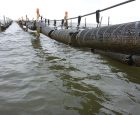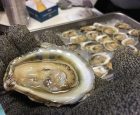
Oil-spill funds could hatch more projects
March 20, 2019
By Matt Jones
Projects in Florida’s Franklin and Wakulla counties are vying for over $49 million in recovery funding from the 2010 Deepwater Horizon oil spill. An application by the Panacea Oyster Co-op is looking to create a multi-purpose sustainable hatchery/nursery processing facility to benefit the industry in the Apalachee Bay, and to expand educational efforts.
 Oysters hanging on the farm of a Panacea Oyster Co-op member. The Co-op plans to use recovery funds from the 2010 BP Oil spill to create a nursery/hatchery/processing facility to bolster the industry
Oysters hanging on the farm of a Panacea Oyster Co-op member. The Co-op plans to use recovery funds from the 2010 BP Oil spill to create a nursery/hatchery/processing facility to bolster the industry CEO Katherine Waldron says that the funding will help the re-growth of the oyster industry after wild harvesting’s devastation by the oil spill and various other factors.
“The decline in the oyster beds in Apalachicola was accelerated because of the spill in 2010,” says Waldron. “It also didn’t help that the fresh water coming in from the streams and rivers in Georgia were lessening due to development up there. And then, of course, Hurricane Michael ended up being the trifecta. The ecological events really devastated those oyster-related jobs and also impacted the viability of the Florida oyster industry as a whole.”
The proposed facility will serve as a hatchery and nursery for oysters and an algae farm. The facility will also include pasteurization and flash freezing processing equipment, which will help expand the markets where oysters can be sold by expanding shelf life. Waldron says that the Coop has passed the pre-application stage and is in the process of filing a full application with their partner, the Florida Agriculture and Mechanical University.
“I would like it to be up and running within a year because it’s all about the jobs and ensuring that we have a ready supply of oyster seeds to our local ranchers,” says Waldron. “If possible, we’d be producing and processing with the large pasteurization and flash freezing within a year, if not sooner.”
Panacea marketing director Rob Olin describes their goal as the resurrection of the coastal community. With the damage to the wild oyster industry, aquaculture becomes an important opportunity to continue the tradition of oyster work in the area. But local growers have had to rely on seed from out-of-state sources for years and have failed to meet targets as a result.
“We need to be able to control our own seed supply,” says Olin. “We need to grow it in our own waters so we have a higher percentage of healthy seed when it comes to maturity. We need to be able to better support all the ranchers, not just the coopers, but all the ranchers down here with their own seed, locally grown at their own hatchery. If we can do that, then everything else that goes with the fund – the pasteurization processing plant, the flash freeze processing plant and all the other marketing avenues that will open up for us – will help everyone down here. It’s going to ensure the long term health of this industry. Without it, I don’t see that we can make it quite frankly. We have to have our own hatchery.”
Advertisement
- Investigation finds shrimp containing antibiotic-resistant bacteria in Canadian grocery stores
- ‘Fear factor’ holding VCs back from aquaculture tech investments







